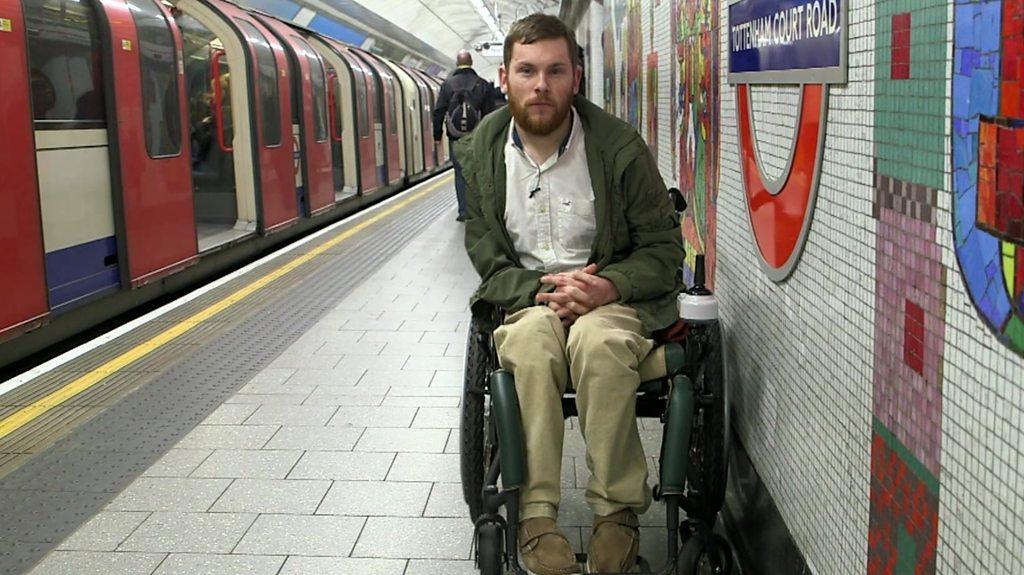'I was stranded on a train in a wheelchair'
- Published
Journalist Alex faced a similar problem in 2016, as this video from the time shows
I have always lived in fear of being late - for work, school and friends.
As a wheelchair user, I get up at 5am for my carer to arrive to help me get dressed, often skipping breakfast to catch the 06:30 train to Waterloo.
I accept this as part of my responsibility. What I do not accept is being late for work because I have been left stranded on the train by platform staff who fail to arrive.
Unfortunately, I faced this exact situation on Tuesday morning's commute, stuck on the train for around 20 minutes - the longest in a catalogue of incidents I have begun recording over the years.
As train passengers departed I waited patiently, but no one came. Once it became clear that I had been forgotten, I was struck not by fear, but rather a familiar sense of frustrated resignation - taunted by the small yet insurmountable gap between the train and the platform.
Tired of being treated like a second-class citizen, today I decided, for the first time, to stream what was happening live. I did not do so for attention or sympathy, but rather to highlight the reality of travel as a disabled person.
Allow X content?
This article contains content provided by X. We ask for your permission before anything is loaded, as they may be using cookies and other technologies. You may want to read X’s cookie policy, external and privacy policy, external before accepting. To view this content choose ‘accept and continue’.
South Western Railway, the train operator behind the service I was travelling on, apologised for the "unacceptable" incident and said an investigation is ongoing.
"We take accessibility seriously and want all of our customers to be able to use our trains safely and comfortably," the company said in a statement.
"We already work very closely with accessibility groups on our network to help us improve our services," it added.
However, it mirrored a near identical situation from 2016, where I was left desperately shouting for help after finding myself completely alone and unable to get to work.
This occurred at the hands of a different operator - South West Trains - but the changeover did not affect staff.
Such humiliating situations are easily avoidable, especially since the train guard in this most recent case, who helped me on board with the wheelchair ramp, had called ahead to arrange assistance with the platform staff.
But many other disabled people have experienced similar situations, including my blind former BBC colleague Lucy Edwards, who also found herself forgotten by platform staff at a London station when reporting for BBC Radio 4.
Alan Benson, chair of accessibility pressure group Transport for All said: "The accessibility of our rail network is now well behind other public transport modes like buses.
"Railway companies (which all make handsome profits) have to stop treating disabled people as second class citizens."
Allow X content?
This article contains content provided by X. We ask for your permission before anything is loaded, as they may be using cookies and other technologies. You may want to read X’s cookie policy, external and privacy policy, external before accepting. To view this content choose ‘accept and continue’.
The frequency of the problems point to a wider systemic problem in wider society's approach to disability.
In March, BBC security correspondent Frank Gardner highlighted the widespread scale of the problem after tweeting about his anger at the "casual disregard" from staff as he tried to disembark from an aircraft at Heathrow.
He said he felt his basic human rights had been denied after his wheelchair was "lost" by staff.
And that is how I felt on Tuesday morning - helpless as the clock ticked down.
Faced with the prospect of guardless, automated trains, I fear for the future and ask that rail companies play their part.
I can accept that mobility takes longer as a disabled person, I can get up at 5am, I can skip my breakfast, but I cannot and will not waste my time.
- Published30 November 2017

- Published8 March 2018
